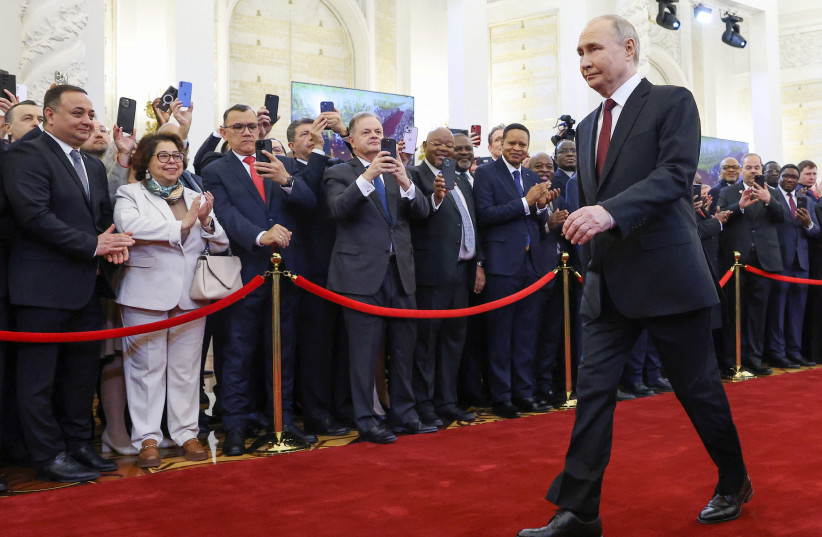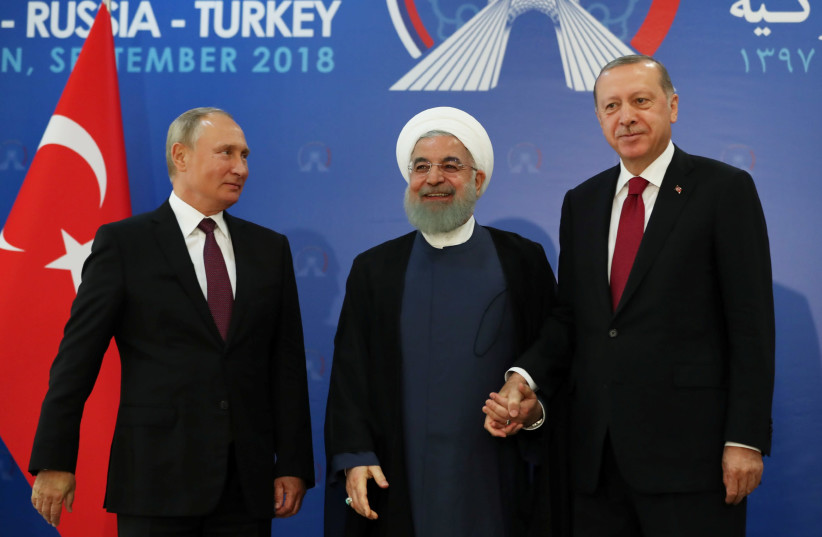West’s protests benefit authoritarian regimes; Is that what you want? – opinion
Across the United States, pro-Palestinian protesters continue to take over academic buildings and campus lawns, vandalizing property and making statements of incitement and hate. In Europe, as well, public demonstrations continue, with protesters in Germany recently calling for an Islamic caliphate. Meanwhile, in the UK, antisemitic hate crimes have reached record highs.
While these blatant displays of extremism, sympathy with terrorists, and antisemitism around the world may be sponsored by numerous groups, and its participants vary from campus to campus and from city to city, there are three players benefiting from the chaos and anarchy: Donald Trump, Russia, and Iran.
As someone who was forced to flee Russia two years ago after I criticized President Vladimir Putin’s invasion of Ukraine and have found refuge in Israel, the threat of these regimes is something I feel firsthand every day.
Protests sow fear
To prevent this threat from growing, measures must be taken to contain these protests in the United States and Europe. Protesters, the media, and those watching at home must also understand the direct and indirect consequences of their perceived fight.
Iran and Russia have both offered statements of support for the campus protests in the United States as well as for the public demonstrations in Europe. Both of these regimes realize that as such demonstrations continue unchecked, they sow fear among the population, strengthening the appeal of the far-right across Europe, where several countries, including Austria and Belgium, and the European Parliament, have elections this year.

Meanwhile, in the United States, Russia sees how the protest movement is ripping apart the Democratic voter base, putting traditional supporters of Israel at odds with left-wing protesters, and dividing Biden’s base. This only works to prop up the extreme parts of the Republican party and its candidate in what is certain to be a cut-throat presidential election this fall.
Russia is following the lead-up to the election in the US with great interest, hoping that Trumpian isolationism, which is not interested in spending money on policing the world, will succeed. After all, that would likely mean less military support for Ukraine.
A more isolationist-oriented US is also to Iran’s benefit, as it would mean less American cooperation with Europe and other allies against the Islamic regime and other foreign threats.
Similarly, in Europe as well, more national governments with far-right participation will likely mean less support for Ukraine, further emboldening Russia. Such a situation would also lead to a weaker European Union as many far-right politicians, using old-fashioned nationalism, propose the exits of their countries from the EU.
This added turbulence also emboldens Russia and benefits Iran, as less unity across Europe ultimately means less unity against Iran and its allies.
Antisemitism benefits regimes
THE REGIMES in Iran and Russia also stand to benefit from the antisemitism radiating from protesters in both Europe and the US, and, in general, rising in societies.
Rather than condemn this, too many politicians are accepting it or excusing it, including on the right. An appalling example of this is US Rep. Marjorie Taylor Greene, who refused to support a new bill that defines antisemitism, and said that the bill’s labeling of the age-old slurs that Jews killed Jesus as a form of antisemitism is a threat to the Bible.
The fact that antisemitism is once again part of the conversation, even in some cases part of the mainstream rhetoric, is obviously threatening to Jews. But it also means that using minorities or certain groups as scapegoats is once again an acceptable political practice.
That puts everyone and every group at risk. This risk is increased in a world where social media, including the use of fake accounts and bots, contributes to the polarization of the electorate, potentially influencing election results, eroding the stability of the world’s democracies, and emboldening the aggressive policies of totalitarian regimes.
I say this as someone whose great-grandparents, and many of their children, were rounded up in Hungary and eventually murdered in Auschwitz. This was not a process that happened overnight with a single order, it was only allowed to happen because of the antisemitism that for decades had been growing in Hungary, often blaming Jews for the country’s economic woes, and laying the groundwork for society to eventually accept anti-Jewish laws, deportations, and murder.
Russia and Iran also benefit from the growing antisemitism in the United States and Europe, as it makes their messages of hate and intolerance more acceptable and palatable, no matter who is the victim.

THOSE IN charge of law enforcement, from police, to government officials, to campus administrators, need to realize what exactly is at stake here and how emboldened regimes in Russia and Iran challenge the principles on which Western democracies were founded.
Those attending such protests in the United States and Europe should think carefully about what sort of future they want for the world, and if they want their children to live under the veil of extremism and authoritarianism embodied in the Russian and Iranian regimes.
If nothing is done, and the current situation continues, freedom and democracy are at risk of falling captive to extremism and hate everywhere. This should raise loud alarms, especially this week, as Israel marked its annual Holocaust Remembrance Day, and Europe marks VE Day, when the Allies defeated the Nazis, ending the Holocaust and ushering in a new era of “Never Again.”
These solemn days should remind the whole world of both the dangers of extremism and the importance of standing against it and defeating it. This is a message the world needs to absorb and act on, to prevent the further rise of the regimes in Iran and Russia and the chaos they want to sow far beyond their borders.
One of the commandments of the Torah is “zachor,” which means “remember!” Memory should not only be for honoring the victims of the past but an active step in ensuring we never return to the calamities of the past.
It cannot be that 79 years after the end of World War II and the Holocaust that the United States and Europe are tolerating protest movements that benefit today’s biggest threats to freedom, pluralism, and democracy.
The writer is the president of the Conference of European Rabbis and the exiled chief rabbi of Moscow. He is the recipient of the 2024 Charlemagne Prize.





Comments are closed.